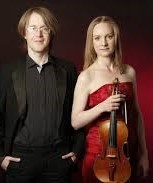Kino Teatr, Sunday 21st January 2018
What better way to cheer up a dull, wet January morning that Beethoven’s Spring Sonata. Published in 1801 as Sonata No5 in F major, Op24, it has an openness and sense of light which radiates throughout, even when it allows moments of a darker reality to seep through. Violinist, Jane Gordon and pianist, Jan Rautio – familiar as members of the Rautio trio – brought real brightness and superb balance to the opening Allegro and an unexpected intensity to the following Adagio. This gave way to the bounce and attack of the lively Scherzo, marked and here played Allegro molto, before the gently flowing optimism of the final Rondo. Some of the audience had clapped after the first movement and Jane Gordon had quite rightly pointed out that this would have been perfectly acceptable in the early nineteenth century and so was equally permissible today!
An unexpected interlude was squeezed in here in the form of the Cantabile JS Bach wrote as part of a revision of his sixth violin sonata. It stands alone quite happily, forming a more formal bridge between the happy brightness of the Beethoven and the much darker world of Debussy’s Violin Sonata in G minor. Introducing this, Jan Rautio pointed out that the composer was going through a bit of a rough time – in fact he was dying – and this may account for the very dark moods that emerge and the fractured structure of the work itself. It may have the conventional three movements of a classical sonata but the content and musical ideas are far closer to the modern music which was emerging early in the twentieth century. The opening movement has many rapid changes of mood as well as texture, and the skittishness of the second movement, marked Intermède: Fantasque et léger has many moments of frantic intensity before coming to a sudden calm conclusion. If in the Finale the sun does not quite shine there are definite moments of optimism which were finely caught by both musicians as Debussy passes the point of focus between them. The only minor drawback at present is the lack of a really good piano for performers of this quality.
The Kino Teatr is a fine venue for chamber music, its close acoustic supporting the players while providing the audience with a comfortable sense of intimacy – the croissants are excellent as well!

